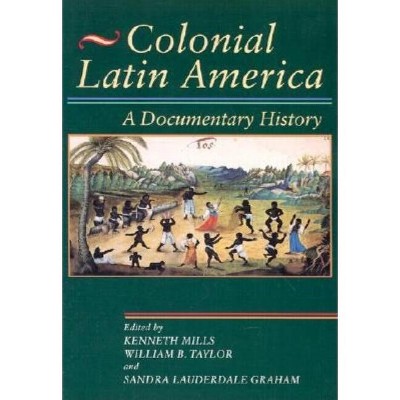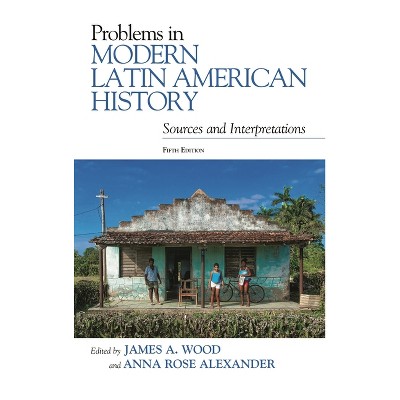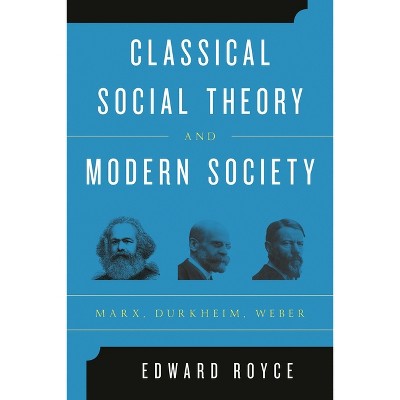Placing Latin America - 4th Edition by Edward L Jackiewicz & Fernando J Bosco (Paperback)

About this item
Highlights
- Placing Latin America offers a thematic approach to the study of the diverse geographies of a globalizing region.
- About the Author: Edward L. Jackiewicz is professor and chair of the Department of Geography and Environmental Studies at California State University, Northridge.
- 272 Pages
- Social Science, Human Geography
Description
About the Book
Placing Latin America offers a thematic approach to the study of the diverse geographies of a globalizing region. Focusing on the dynamic connections among people, places, and environments, this nuanced text will be an invaluable guide for all those interested in the politics, ...Book Synopsis
Placing Latin America offers a thematic approach to the study of the diverse geographies of a globalizing region. Focusing on the dynamic connections among people, places, and environments, this nuanced text will be an invaluable guide for all those interested in the politics, economy, and society of a rapidly changing continent.
Review Quotes
The latest edition of this successful book edited by Jackiewicz (California State Univ. Northridge) and Bosco (San Diego State Univ.) continues to represent the concerns of earlier versions while bringing the reader more up to date interpretations of the continuously evolving issues that manifest the region's dynamic characteristics. Changes in the region have been profound in recent years, yet key themes persist in practice. As in the first edition (CH, Feb'09, 46-3426), each chapter could stand alone, permitting the reader to approach the book selectively. Several authors advance the significant issues within their respective chapters. The book is again organized for conceptual continuity, first dealing with historical, then economic, political, and finally border and urban themes. Importantly, some topics not previously dealt with are incorporated, such as environmental politics, tourism, new issues related to child welfare, and the presence of significant numbers of Latin Americans in the US. Each chapter includes its own list of suggested readings, and some also cite recommended relevant films. Key terms, too, are listed here, emphasizing main concepts that could escape the grasp of newly initiated readers. Black-and-white maps and photographs support the text, and most chapters employ text boxes to provide closeup treatments of significant examples. Summing Up: Recommended. Lower-division undergraduates through faculty; professionals.
A refreshing look at human geographic themes that will serve as a cornerstone in any course in the social sciences about Latin America and the Caribbean, especially geography. The inclusion of social movements, cinema, sustainable tourism, human rights, and NGOs is particularly welcome.
Bar none, this is the best geography text on Latin America. Accessibly written chapters by geography experts review timeless and emergent themes, from boom/bust cycles of economic change to the new geographies of immigration enforcement. Updated to reflect the latest changes in the region and in its scholarship, this latest edition of Placing Latin America will ensure the steady appeal of this text for intro-level and advanced students alike.
Finally! We now have a text on Latin America that we can use in our Geography of Latin America classes without having to resort to texts of the past that covered each region or country in the repetitive fashion of 'physical landscapes, history, and culture.' Rather, Jackiewicz and Bosco bring together a collection of essays on topics that dominate Latin America today. After grounded and necessary chapters on history and the physical geography of the region, the authors lead us into what is taking place in Latin America today, from the drug trade and control of natural resources to timely exploration of urban issues and human migration throughout the Americas. I cannot wait to introduce my students to Latin America through the lens of these authors. Thank you.
In depth and great selection. Good for upper-level undergraduate courses and graduate courses.
Jackiewicz and Bosco's Placing Latin America is a multidimensional and timely exploration of the diverse human geographies of Latin America. It's refreshing to encounter a text that so masterfully weaves robust and critical thematic coverage of Latin America together with a nontraditional regional approach that recognizes and engages with the region's multiscalar and transnational reality. Chapters on historical geographies, political economies, geopolitics, urban geographies, sustainability, and human-environment interaction provide new insights into classic themes in Latin American geography, while chapters on the US-Mexico borderlands, social movements, geographies of children and young people, drugs, tourism, and foodscapes bring new perspectives and voices to vital conversations and debates. This volume should be required reading for any undergraduate course and graduate seminar in Latin American geography.
Numerous respected Latin Americanist geographers tackle a wide range of current issues in this timely volume. Many of the chapters discuss the failures of neoliberalism and modernization and highlight the role of new social movements and political regimes in contesting orthodoxies of globalization. Essays on such newsworthy topics as migration, border issues, cinema, and drugs should engage the attention of students. This is a valuable and welcome addition to the textbook literature.
Respected Latin Americanist geographers tackle a wide range of current issues in this timely book. Many of the chapters discuss the failures of neoliberalism and modernization and highlight the roles of new social movements and political regimes in contesting orthodoxies of globalization. Updated chapters on such newsworthy topics as cities and sustainability, natural resources, genetically modified crops and food, tourism, drugs, children, social movements, and the border will engage the attention of students. This continues to be a valuable and welcome contribution to the textbook literature.
The editors have crafted a highly readable and relevant fourth edition of Placing Latin America that showcases dynamic shifts in the social and economic geographies of the region. Collectively, the diverse contributors cast a spotlight on regional concerns regarding social justice, economic inequality, sustainability, urbanization, and the transnational reach of Latin American goods and people. Up-to-date and with many helpful references, this book will resonate with college students. It is an ideal foundational text for any Latin American geography course.
This collection provides insights on many of these transformations, showing the region as a dynamic, adaptive area adjusting continually to changes in a competitive world environment. . . . Helpful bibliographic citations are found at the end of most chapters. Written by geographers, the compilation provides a greater understanding of issues facing the region, themes not commonly found in texts and other printed material. For that reason alone, the book is an important read for all those interested in Latin America. Highly recommended.
About the Author
Edward L. Jackiewicz is professor and chair of the Department of Geography and Environmental Studies at California State University, Northridge. Fernando J. Bosco is professor in the Department of Geography at San Diego State University.










